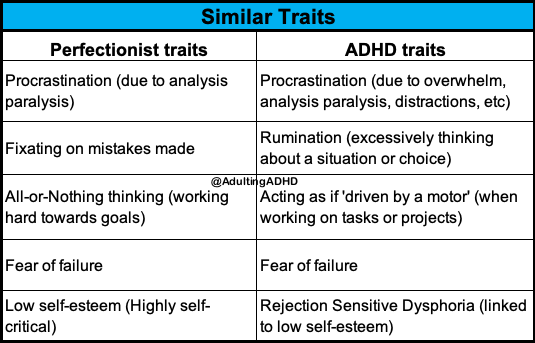
I’ve never considered myself to be a perfectionist. The word perfectionism in the same sentence as ADHD seemed like an oxymoron. However, my research has led me to believe that there’s some crossover between some perfectionist and ADHD traits.
In this newsletter, I cover perfectionism masking ADHD traits, perfectionist traits, similar/shared perfectionist and ADHD traits, and the negative impacts.
ADHD masking
Masking could be defined as an individual concealing their personality to conform to social pressures or societal expectations.
Many adults with ADHD mask their symptoms/traits long before they’re diagnosed with ADHD and even after they have been diagnosed with ADHD.
In a previous newsletter, I referred to a study I read on ‘Skills and compensation strategies in Adult ADHD’. The study found that participants used strategies to cope with ADHD symptoms/traits before their diagnosis. The most common strategies used were reminder apps, physical activity, and developing routines.
Linda Roggli suggests that adults with ADHD mask by constructing facades to hide personality traits - perfectionism is one example:
“THE PERFECTIONIST: I must do everything perfectly. Then perhaps no one will notice that the rest of my life is a mess. The Perfectionist works so hard to overcompensate for ADHD that he or she may have control issues.” - Linda Roggli
Perfectionism
According to Healthline, “People with perfectionism hold themselves to impossibly high standards.”
I’ve never considered myself to be a perfectionist. I’m not pedantic, I don’t always triple check my work, and I was never driven to be an overachiever when I was a student. Now I realise that I did not really understand what perfectionism was.
Here are some examples of perfectionist traits I came across during my research:
Procrastination.
Obsession with lists, and work.
Taking a great amount of time to complete a task that would not take others long to complete.
Fear of failure/disapproval from others.
Being self-critical, such as fixating on your mistakes.
Having unrealistic standards.
‘All or Nothing’ thinking.
There are many other examples of perfectionist traits. I have listed examples that some people with ADHD might relate to the most.
Perfectionist and ADHD traits
Below is a table I made, outlining shared/similar perfectionist and ADHD traits. The traits in the table have been backed up by research papers and various articles.

Does the above ring any bells?
Impact
Perfectionism is usually seen as a positive trait. Individuals who are known/perceived to be perfectionists are often admired and held in high regard. However, perfectionism could cause anxiety, lead to burnout, insecurity, and possibly depression.
Many people with ADHD struggle with one or more executive functioning skills. Due to this, we use various coping strategies and ADHD hacks to enable us to improve our executive functioning skills. Whilst this is a good thing, it could also lead to us adopting perfectionist traits like unrealistic/high standards, results focussed, self-critical, fear of disapproval of others, and discontentment. If I’m being honest, I have experienced this, and I think it is due to me wanting to better manage my traits in order to perform better at work and in my personal projects.
I think it’s fair to say that most ADHD coping strategies target productivity and efficiency. This isn’t a bad thing, but if we’re not careful, we can easily become victims of the ‘always on’ and ‘hustle porn’ culture. This could lead to burnout, feelings of inadequacy and depression in some cases.
So what do you think? Comment or tweet me!
Rach, with ADHD.




Hi! I'm so grateful I found this space :) I've been working with my psychologist on ADHD diagnosis. And she specifically asked if I was "gifted" in primary school, which was true. She shared with me some journal articles about the prevalence of ADHD and perfectionism/imposter syndrome in adult "gifted kids". Further-- they're more likely to be diagnosed later in life, not only because ADHD is generally a struggle for diagnosis, but because of intelligence, performance, and even success in their profession. It was such an "ah-ha" moment for me and it has since been like a weight has lifted that I've been carrying around my whole life. It has allowed me to let go of some of my perfectionist tendencies and change the way I talk to myself. Exploring this diagnosis has changed my life-- and it's only been about a month of this!!
Thank you for this space :)
I'm definitely a perfectionist. I wouldn't say it benefits me in the same way it does other people (probably neurotypical). For example, I've developed a very rigid daily routine, mainly to manage my chaotic sleep patterns. I get way too upset if something disrupts it.
Very interesting read! :)